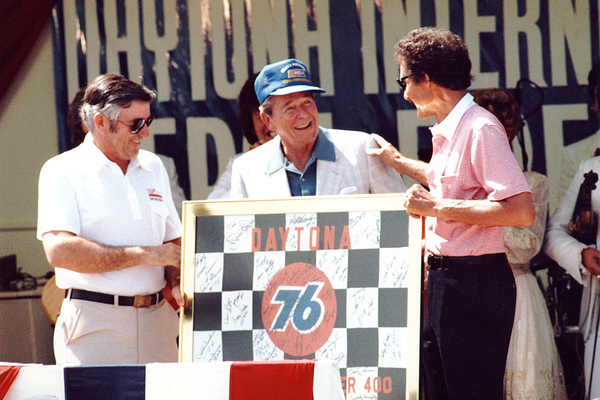

NASCAR in its golden period was a big part of American popular culture. While the Fortune 500 companies and sponsors entered NASCAR in the late 80s and early 90s, many considered the 60s to be the golden era of racing. While that era is known for the rise of legendary driver Richard Petty, many other veteran drivers also made their name in the sport.
Junior Johnson is one of the prominent personalities that comes to our mind when we talk about NASCAR in the 60s. He might not have seven championship trophies in his cabinet, but his impact was profound. Apart from his exploits on the racetrack, Junior Johnson was involved in some illegal activities that landed him in trouble with the law. America’s 40th President, Ronald Reagan, had to come to his rescue, and this is indeed one of the most interesting stories in NASCAR history.
ADVERTISEMENT
Article continues below this ad
Junior Johnson and his involvement with the illegal liquor trade
Back in the day, NASCAR was just growing into a mega sport as we know it today. Although the prohibition on the sale and distribution of alcohol was lifted, many of the early NASCAR drivers were involved in moonshine. In Junior Johnson’s case, his family was involved in the illicit business even before he was born.
Johnson’s father was deep in the illegal liquor trade and spent nearly twenty years in prison. Well, the legendary driver himself tiptoed his way into this business and became a moonshine runner. He was smart and modified the engines on his race cars to produce more power. Surprisingly, he also understood the aerodynamics of the cars he used, removed the windshield wipers, and taped up the openings of the headlights.
Thanks to these interventions, he was able to pick up an extra 10 miles per hour at top speed, which was enough for him to outrun the law enforcement vehicles. He was a real craftsman in doing this and was able to escape the clutches of the law while riding his modified car. However, he wasn’t lucky enough to run his illegal distillery and had to spend a year in prison in Ohio back from 1956 to 57.
December 26, 1985: Junior Johnson was granted a presidential pardon by Ronald Reagan, forgiving his 1956 moonshining conviction
“It makes me feel like I’m finally finished with what happened. I’m just glad it’s over.” pic.twitter.com/UF0O2R6N2E
— nascarman (@nascarman_rr) December 26, 2024
Although he was released from jail and was able to compete in NASCAR races, Johnson’s privileges as a U.S. citizen were restricted. The biggest of all being his right to vote in an election. Well, his right to vote was restored in 1986, when President Ronald Reagan granted him a pardon. “It makes me feel like I’m finally finished with what happened. I’m just glad it’s over.” Johnson was quoted saying this after the pardon.
A social media page named nascarman shared the throwback post of Junior Johnson’s story from the past on X. The caption of the post read, “December 26, 1985: Junior Johnson was granted a presidential pardon by Ronald Reagan, forgiving his 1956 moonshining conviction.” Well, as it turns out, this wasn’t the only time President Reagan was associated with a driver. He was in attendance to see Richard Petty win his 200th race at the Daytona International Speedway.
Trending
The President meets the King
NASCAR over the years has gifted the racing community with some iconic memories. However, very few of them come close to President Ronald Reagan’s visit to the Firecracker 400 race at Daytona to witness Richard Petty create history on the racetrack. The event was very competitive with some of the best drivers contending for the win. The race witnessed a total of 29 lead changes, but the defining moment came on Lap 158 when a crash brought out the caution flag.
Back in the day, the driver who made it first to the start-finish line and got the yellow was awarded the win. And Petty was just about to do that, as he edged in front of Carl Yarborough and took the win by a whisker. But this win didn’t come easy as the two drivers traded blows, and Petty had to devise a strategy after being passed by his rival on the final stretch.
Recalling the trick that he had up his sleeves, the King recalled the final lap move while speaking to NASCAR. “We ran down the front stretch, and I kept him high(…) If you get really close to a car, then you kind of bog it down, or it bogs you down. In other words, kind of stick together. When we got there, it was automatically going to put me in front because I was going to run a shorter distance than he did.” And just like that, Petty registered his 200th and final career win in NASCAR.
ADVERTISEMENT
Article continues below this ad

ADVERTISEMENT
Article continues below this ad
President Reagan also joined in the post-race celebrations with Richard Petty as he was escorted by several NASCAR drivers. Well, the President even stayed for a post-race lunch where he devoured just good, old Kentucky Fried Chicken. And that’s how one of the most iconic days in NASCAR racing history concluded.
ADVERTISEMENT
ADVERTISEMENT
ADVERTISEMENT






Debate